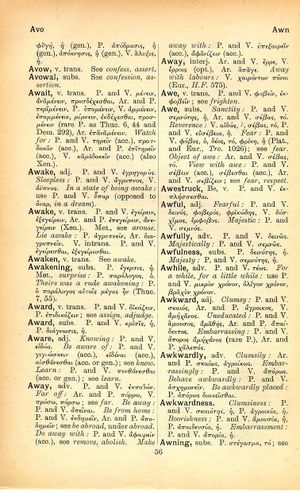awake: Difference between revisions
From LSJ
Ζήλου τὸν ἐσθλὸν ἄνδρα καὶ τὸν σώφρονα → Probi viri esto temperantisque aemulus → Dem Edlen eifre nach und dem Besonnenen
(Woodhouse 2) |
(CSV3) |
||
| Line 1: | Line 1: | ||
{{ | {{Woodhouse1 | ||
| | |Text=[[File:woodhouse_56.jpg|thumb|link={{filepath:woodhouse_56.jpg}}]]'''adj.''' | ||
P. and V. ἐγρηγορώς. | |||
<b class="b2">Sleepless</b>: P. and V. [[ἄγρυπνος]], V. [[ἄϋπνος]]. | |||
<b class="b2">In a state of being awake</b>: use P. and V. [[ὕπαρ]] (opposed to [[ὄναρ]], <b class="b2">in a dream</b>). | |||
'''v. trans.''' | |||
P. and V. ἐγείρειν, ἐξεγειρειν, Ar. and P. ἐπεγείρεις ἀνεγείρειν (Xen.). Met., see [[arouse]]. | |||
<b class="b2">Lie awake</b>: P. ἀγρυπνεῖν, Ar. διαγρυπνεῖν. V. intrans. P. and V. ἐγείρεσθαι, ἐξεγειρεσθαι. | |||
}} | }} | ||
Revision as of 09:21, 21 July 2017
English > Greek (Woodhouse)
adj.
P. and V. ἐγρηγορώς.
Sleepless: P. and V. ἄγρυπνος, V. ἄϋπνος.
In a state of being awake: use P. and V. ὕπαρ (opposed to ὄναρ, in a dream).
v. trans.
P. and V. ἐγείρειν, ἐξεγειρειν, Ar. and P. ἐπεγείρεις ἀνεγείρειν (Xen.). Met., see arouse.
Lie awake: P. ἀγρυπνεῖν, Ar. διαγρυπνεῖν. V. intrans. P. and V. ἐγείρεσθαι, ἐξεγειρεσθαι.

